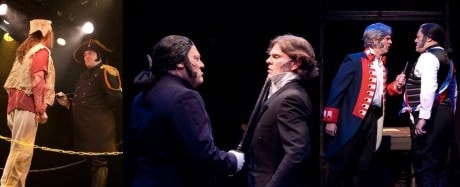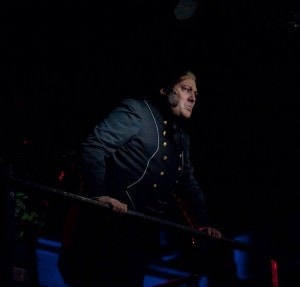He is the law and the law is not mocked. He has done his duty and nothing more; the man with black and white convictions, Inspector Javert. In the penultimate piece of the “Behind the Barricade at Toby’s” interview series I sit down with veteran actor Lawrence B. Munsey to unearth the humanity behind this seemingly villainous character; exposing the truth behind Inspector Javert in his long pursuit of convict Jean Valjean.

Amanda: A little performance background for our readers before we start, just so they can have a sense of what you’ve done in the area over the last year.
Larry: Before Les Mis I directed the regional premier of In The Heights at Toby’s here in Columbia. Before that I was the constable in Fiddler on the Roof, also at Columbia, and had previously played Captain Von Trap in The Sound of Music at Toby’s of Baltimore back over the holidays. Last fall I was in Big at Adventure Theatre out at Glen Echo Park, I played MacMillan, the owner of the Toy Shop. I did that around the same time I directed The Color Purple at Toby’s. Before that it was Callahan in Legally Blonde here in Columbia, and a reprisal of Edna Turnblad in Hairspray over at Toby’s of Baltimore.
Why is Javert the dream role for you?
Just the power behind the character. I knew it was going to be a stretch and something that I was going to have to work at, but I knew that it was inside of me. When I saw the show that was the character that I was drawn to mostly. I think the loner aspect of it is what drew me to him. There’s this whole show going on and he seems to be on the outskirts of it, running around it. I was just drawn to that character and his journey.
How does Javert differ from other roles that you’ve previously played?
Well, again, using the same word the power behind this man has not been in any of the other characters that I’ve played. There is a depth in him that has not been in any of those other roles. I’ve played great characters and I’ve loved them all but this one just has so much substance to it. And a bigger arch of a journey.
Les Misèrables is a journey show, and as you mentioned Javert has a journey of his own, how are you making his journey a part of this epic run, what has that process been like for you?
I’m just telling the story. I’m just listening and being an active listener to Jean Valjean. And our arches actually just kind of pass each other as well. I have my own journey which coincides with his, I think, very much. He teaches me. He teaches me the gray. I learn that there is gray in the world, but it’s too much for me to handle. Obviously I was brought up— I mean I was born and raised in a jail. Everyone has to choose their own way. I chose the path. I was sticking to the path. You know, so obviously I was brought up with nuns, I would think, in an orphanage. I was born in the jail so where would I really end up going? And I think that’s where the structure of him comes from, you know that clergy structure of that time period. Now he’s not a member of the clergy, but I believe that he was brought up within the church, their orphanage, and that shapes him.
Javert’s convictions are extremely guided by his religious faith. Do you find yourself relating to that in a similar or differing fashion. Can you draw parallels between your faith and his?
I have a constant struggle within myself with the Bible. I find myself…I am what I would consider very religious. I was brought up in a family that is full of ministers. So I’ve always had a strong Christian background, always went to Sunday Schools, and we were always just really involved in the church. And now, growing up, I have a struggle between what’s written and what my subconscious is telling me is true. So there’s an inner struggle.
So I find that at the end— it’s very close to home. I can understand that struggle between what is supposed to be the book, and live by the book, and honor the book and the book is the word…but I don’t necessarily believe everything in the book.
How do you personally relate to Javert’s absolute black and white views on the world?
Well I do believe there is right and there is wrong. And we know what right and wrong is. And if we choose to do the wrong, then we have to have those consequences. So by the law, I’m very black and white. There is no gray area for me. I mean stealing is stealing. If you’re going to have to justify situations in which the law can or should be broken then why have the law? I might not agree with the law, but then it’s my duty to have the law changed. Then I have to strive for that change.
Now I’m not saying I’ve never broken a law, I’m not saying that I’m good or bad. What I’m saying is that the law is the law and that if I chose to break the law it’s a choice. But then there are repercussions that I have to own. I broke the law knowing that that’s the law, therefore…when I drive without my seatbelt and I get pulled over— now I don’t drive without my seatbelt— but if I did, I know the law. I deserve everything that I get if I’m caught.
By that logic do you believe that Jean Valjean deserved everything that he got?
I think it’s harsh and I think it’s put very in a dramatic sense. I mean – hello – we have a loaf of bread because a kid was starving. But he really did break the law. And good reason or not, did he not break the law? He broke the law. And I even say “five years for what you did—”
Five years for stealing a loaf of bread?
And breaking and entering.
He broke a windowpane.
Well? That’s breaking and entering. He was not welcome in that house. He forced his way into the house. He stole a loaf of bread. Two crimes. Now, do I, Larry Munsey think that’s harsh? Sure. But as Javert— this is not up for debate. He did break the law, two different ones, he got five years for it. And then the rest because he tried to get away. So obviously he wasn’t the model prisoner – you know what I mean?
This show puts Valjean as this really just triumphant guy, and I’m not buying it. I’m not buying it. It really pisses me off that Javert is the mean guy. Not the mean guy – the bad guy.
You’ve segued perfectly into my next question—Javert is the antagonist but he often gets labeled as the villain or “bad guy” but you clearly disagree with that. Why?
He’s not the villain. Why is he? Because he’s going after a guy who broke the law and then does the parole thing and rips up it up and says, “Oh, well that’s all gone now, move on?” Let me tell you, I’m very much on that same side of Javert. I’ve got the same drive in the sense that, “Oh, you did wrong, and now you’re not going to serve the time?” I would be right on that person’s ass. It pisses me off when someone thinks they are above having to answer, not even just to the law, but to authority. When someone is defiant like that – I hate it. It angers me because everyone else has to answer, but you don’t because you don’t want to do it? That’s unacceptable. When someone is defiantly breaking a rule that’s been clearly laid down – it infuriates me.
What was your approach to the overall creation process of this larger-than-life iconic antagonistic character, and making him your own so that he is different from any other Javert we have seen or might see out there?
It’s a hard question because he slipped on so easily and comfortably. I know this man. And I did not have to work to relate to him, because I never thought he was a villain. I mean, I think he needs to take a chill pill and relax a little bit, maybe have a cocktail or two… buy of course he doesn’t drink.
I read the book a long time ago, I did not read it recently or refresh because the book is just mammoth and you put it into a 14 hour musical and you still aren’t going to grasp everything, so I didn’t want that. I didn’t watch the movie, I’ve seen the show several times, but none of that was really a part of this.
I am so far from the method actor – it’s like a whole different person that I don’t know suddenly takes over. It’s really strange that he kind of takes over, I don’t know how to describe it. And then I come back and I’m off stage and I’m Larry again and it’s fine. But when I’m on stage I don’t feel me at all. There will be a moment where I’ll go up on a word or something and Larry snaps back in and says, “Oh what the hell are you doing?” But I don’t feel like I’m putting him on – I feel like he puts me on.
How has your relationship with Javert changed from the beginning of the rehearsal process to now?
I don’t feel like it’s changed a lot. I try to find new moments within the show every time I’m doing it so that it’s fresh and new, but I feel like it’s within a foot of each other. It plays within a certain boundary, you know? It’s very funny because when I step on that stage and I look at Dan (Dan Felton— Jean Valjean) it’s Jean Valjean and Javert, so I never see Dan, you know what I mean? I just always see them.
When you come down to it, I believe that there’s one emotion. There’s love and there’s hate. And it’s the same thing. I believe there’s a sense of loving this man as well. Not loving as in a sexual overtone or undertone, and I don’t think Javert recognizes this about Valjean, but why is he drawn to this man? It can’t be just obsession or Javert not being able to let it go, because if it’s just that then the play doesn’t go anywhere. It’s just two hours of this guy running around chasing this convict. There’s a relationship build; very much like in Catch Me If You Can, the movie, not the musical. The cop is chasing him, constantly, but there’s more than just the hate. It’s very similar to that. You build this relationship. I’m not saying that necessarily reads through but it allows me to have my connection.
When I see him picking up Marius, when I see the compassion that this man can give…I’m jealous. I can’t handle it. I don’t know how to handle it— this emotion. It’s a new emotion. It’s almost admirable, you know? To admire someone who’s a thief…but he’s good? So there’s just this struggle that he doesn’t know how to handle. And its part of that love/hate thing, being the same word, and kind of the same emotion because God, you can love very hatefully. And you can hate with love because you wish that person could be a better person.
It all gets kicked in motion, Javert’s turning point where he just can’t handle it, in the ABC Café when Valjean lets him go. It’s the, “Wait a second, you have me, and you’re letting me go.” And that just starts his change that leads to his demise.
If that starts the change then why is Javert still so furious at the top of the sewers when he sees Valjean escape the fall of the barricade with Marius in tow?
I’m not mad at him. In my head, I’m mad at God because I’m feeling these feelings. So that’s where the anger comes in – it’s not at Valjean. It’s the fact that I’m looking at this man doing good and, “What is this? Am I going to let him go? This cannot happen. I don’t know what to do, what do I do? God, please help me. This is my job and I have to do my job.” Valjean getting away has nothing to do with that moment for me. It all comes from my own internal confusion and frustration at God because my world has been turned upside down.
You know I’ve actually quite recently had this epiphany about him. Javert actually commits a crime. He allows compassion to rule his decision over his duty when he makes the final decision about bringing Valjean in. He allows him to go free. Jean Valjean says, “Look at this man (referring to Marius) he’s dying.” And then I say, “Take him and go before I change my mind.” In that moment Javert becomes human because he chooses compassion. But it’s a crime. It’s his job, it’s the law. It has been his duty all along to capture this man but he consciously chooses to let him go. I’m letting a fugitive run – I’m letting him go. I sing this line every night and I know what I’m saying, I know the line. But it just dawned on me that it’s a crime. So I’m kind of a badass in that sense, because I committed a crime.
What has it been like playing opposite Dan Felton?
Dan has been the most amazing journey through every rehearsal. I feel like we’ve both put out 100% and were passionate about the piece and were respectful of each other. I cannot imagine doing this with anyone else. It just honesty – he makes me do good. He makes me try harder and again, and I just cannot imagine doing this without him.

I was never known to be the singer at all. I was always a dancer and I’ve learned to sing. I was very nervous coming into this because Dan has always been a singer – that’s his thing – and knowing that I was going to be working opposite of him, I was like, “Oh my God, I have to work really hard, because he cannot leave me in the dust.” And working with him made me step up my game. I have such respect for him. The first day we did a sing through he told me, “You’re going to be great in this.” It made me feel really great, it boosted my confidence. It’s just been so great, so really awesome.
What will be the hardest thing to let go of when Javert comes to a close for you?
I don’t know. There are so many things, really. I’m going to miss working with Dan, coming in and having that relationship. You know most times when you do a show you’re opposite of a woman when you play a lead role. Getting to play opposite Dan – with everything he brings to the table – has just been really incredible and I really am going to miss having that every day. Also, letting go of the pride that I have in doing this. I’m just so proud of it that I’m really going to miss it. In my career this is the role I’ve been most proud of, absolutely, so letting that go will be really difficult.
What has been the most challenging thing for you as Javert?
I think it’s about making him human and not just a machine. Too many times I’ve seen the part where it’s just this machine— this guy chasing the other guy, Javert’s the cop and he’s just there for the chase. And making him have human traits and having that journey— that’s been the thing that I’ve been so proud of people telling me, “I’ve never understood this guy before,” but now they seem to understand him. So I’m proud of that. I just wanted to really concentrate on making him human.
What about the most vocally difficult thing you’ve encountered in this show?
The recitatives in the singing. It’s so difficult because it has to be within conversation mode. So it can’t be about the note…it’s got to be about the sentence. I think that they were just hard! They come out of nowhere.
And then I have three sets of fours to count as I’m climbing up the staircase, trying to keep track of it all. It’s hard – acting and singing and climbing up the stairs all at the same time.
If it wasn’t Javert for you, who would you want to be in the show?
Eponine. Seriously, though? It’s funny you ask that because I just wouldn’t do the show. I had already planned that if I wasn’t offered Javert that I wouldn’t do the show. I mean I didn’t put that down on my audition sheet because I think it comes across cocky and bitchy if you put it down, but it wasn’t like that for me. If I didn’t get it that would have been fine but I had no desire for another role, and you shouldn’t take a role if you don’t have the desire to do it. I’ve seen that happen far too many times and it just doesn’t make a good show. So for me it’s always been Javert.
What is the moment that moves you every night you see it?
I’m trying to run through the show in my mind because if there’s a favorite part I need a minute to figure out what it is. Well I have two. It’s “Stars” for me and then “Bring Him Home.” They’re two of the power ballads but I think that they’re raw moments where the reality of where these characters are really comes out. They are at this point in their lives and it’s so much that all you can do is sing about it. Singing “Stars” is also the thing that I love singing the most, it’s just written so beautifully and it’s such a wonderful moment.
Javert gets to fill the empty stage a little bit, there’s very little movement during “Stars” and the sets are all but stripped away, so that’s a powerful moment for me. But I think Dan masterfully makes everyone stop looking at anything else and just focus on him when he’s singing “Bring Him Home,” even though the stage is full of people. So I think he just does that so masterfully.
What’s the song in the show that you don’t get to sing that you wish you could sing?
“Bring Him Home.” It’s such a gorgeous number, and for everything I mentioned before, it’s written so perfectly and it’s just that moment of pure human emotions.
What has undertaking this role taught you about yourself as a performer?
That I can do it. That I could live up to this challenge and succeed. Javert is unlike any role I’ve done before, I know I said that. And I know that there was a lot of doubt going into this. I was so nervous, I mean everyone wanted to be a part of this show and a lot of people were after this role. And like I said, going into this with Dan— someone who is known as a singer— there was a lot that really made me know that I had to succeed. And I think I have; I think I’ve really accomplished what I set out to do with him and that I’ve surpassed everyone’s expectations in this role.

The signature line that everyone says moves them, “To love another person is to see the face of God.” What does that mean for you?
I think that the emotion of love is the purest and most honest emotion in this physical world. It’s the highest form that we on this level of existence can show another human being. So if you believe in God, loving someone is as close as you are going to get—in this world—to seeing God. Loving someone is the purest rendering of that. And to have that in your life makes you blessed.
Why see Les Misèrables at Toby’s?
It’s the intimacy. In the round, in the space that we’re in, we can’t be mammoth we don’t have these enormous sets to hide behind. I mean we still have these incredible set pieces, but it’s no longer about the spectacle and enormity of the set. The story has to be told and in our production you have to rely on the story, trust in the story and tell it. Our production really fleshes out the characters because that’s the only way you can tell this story, and I think in other productions you miss that. We tell the story like it’s never been told before, we make you a part of it and we bring the story, the lives of these characters right to you like you’ve never experienced it before.
______
Les Misèrables plays through November 10, 2013 at Toby’s Dinner Theatre of Columbia—5900 Symphony Woods Road in Columbia, MD. For reservations, call (301) 596-6161, or purchase them online.
Read the review of Les Misèrables on DCMetroTheaterArts.
Be sure to check out the ongoing interview series:
Behind the Barricade at Toby’s: Part 1—an interview with Director Toby Orenstein.
Behind the Barricade at Toby’s: Part 2—an interview with Musical Director Christopher Youstra.
Behind the Barricade at Toby’s: Part 3—an interview with The Lovely Ladies of the Ensemble.
Behind the Barricade at Toby’s: Part 4— an interview with Ben Lurye as Enjolras.
Behind the Barricade at Toby’s: Part 5— an interview with Jeffrey Shankle as Marius.
Behind the Barricade at Toby’s: Part 6— an interview with David James and Theresa Cunningham as the Thènardiers.
Behind the Barricade at Toby’s: Part 7— an interview with MaryKate Brouillet as Eponine and Katie Grace Heidbreder as Cosette.






This series has been great! Please tell me that you didn’t forget 24601 and that you’re just saving the best for last? I can’t wait to read that one.
He’s next and will be posted tomorrow.